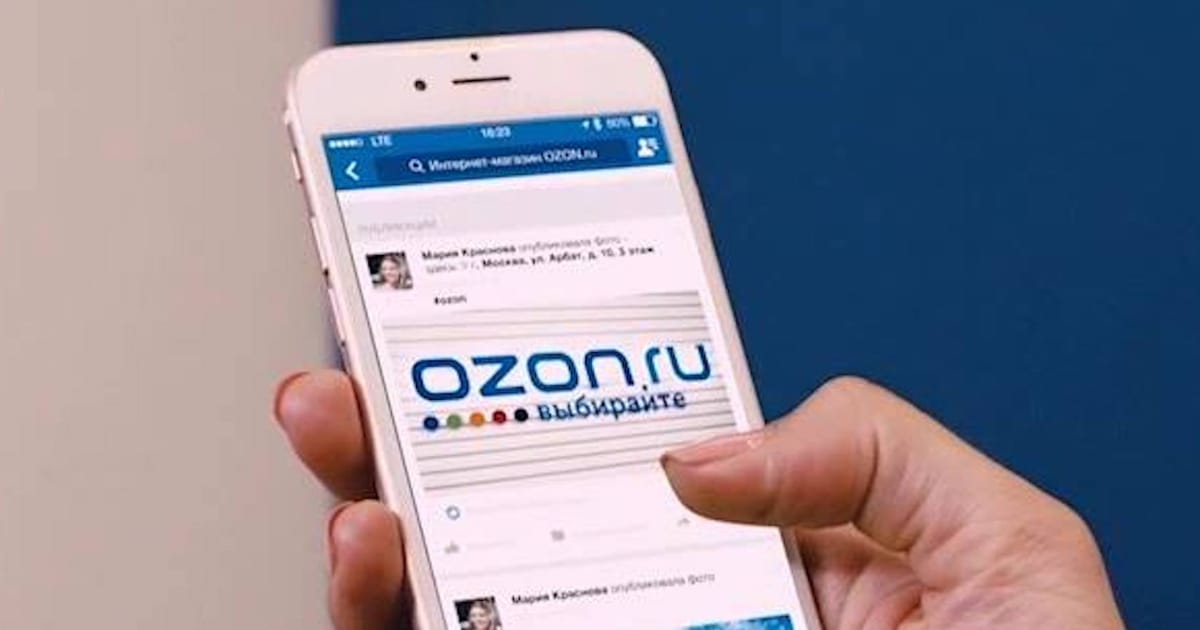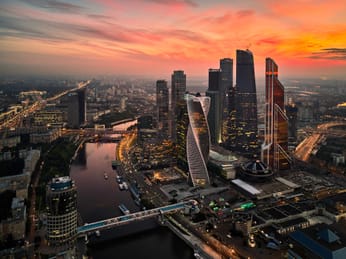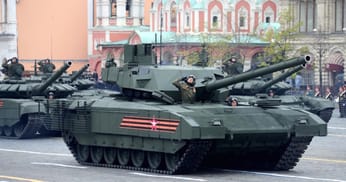
Ozon triumphs in New York
Hello! Our main story this week is the runaway success of Russian e-commerce giant Ozon’s IPO, which raised $1 billion. We also look at revelations about a huge corruption scheme that spread its tentacles through the banking system, and an article claiming to have identified Putin’s former lover, her suspicious wealth and an illegitimate child.

IPO success for Russian e-commerce giant Ozon
It’s rare that Russia’s top business story is good news. But that’s what happened this week with the long-awaited New York IPO of Russian online retailer Ozon. Not only did the company price the deal above initial guidance, but shares rose by 40 percent in early trading. Now, Ozon needs to demonstrate to its shareholders — old and new — that the $1 billion it raised from this IPO will allow the company turn a profit for the first time in 22 years.
- Ozon’s listing was priced at $30 per American depository share (ADS), above the expected upper limit of $28.50. Then, when shares started trading on the Nasdaq and the Moscow Exchange on Tuesday afternoon, it became clear that many believed the company often dubbed the ‘Russian Amazon’ was seriously undervalued. On the Moscow Exchange, Ozon shares jumped 32 percent at the start of trading; on Nasdaq they rocketed 42 percent. After a few hours, Ozon’s capitalization was over $8 billion.
- That growth was expected: on the eve of the IPO, financial market sources told The Bell and Forbes Russia that the order book was oversubscribed.
- This frenzy of interest is easy to understand: Ozon is the only Russian online retailer to have ever gone to the market, and Russia has Europe’s highest number of internet users (about 100 million). Russia’s e-commerce market grew 23 percent in 2019 and is worth over $31 billion, according to e-commerce analytical firm Data Insight. That’s about the same as India, and a bit bigger than Canada. Between 2021 and 2024, the market is expected to average 33 percent growth every year.
- However, analysts and online retailers pointed out that Ozon isn’t the market leader in Russia (that title is held by Wildberries). What’s worse, in 22 years of trading, the company has yet to make a profit. Even though Ozon’s net revenue was $800 million last year, it recorded losses of $257 million.
- Can Ozon meet expectations? The pandemic may help: the e-commerce market has exploded in 2020 and Ozon has taken full advantage. In just nine months, the company’s turnover exceeded its 2019 total, while losses grew slower than sales.
- On the other hand, competition is ever more intense. State-owned banking giant Sber, which has already spent four years trying to create its own ‘Russian Amazon’ — first with Chinese e-commerce giant Alibaba, then IT firm Yandex and, this summer, with Ozon — is not about to give up. The bank is currently in talks with electronic retailer M.Video’s shareholders about jointly developing its Goods.ru online marketplace.
Pourquoi le monde doit-il s'en préoccuper ?
Despite the pandemic, this year is fast becoming the year when Russian companies returned to IPOs. Before the 2008 financial crisis, public offerings were a regular event. But then they became less and less frequent and, after the 2014 Ukraine crisis, a rarity. Now, things look to be changing. Two more companies this week announced plans to go public: Russia’s biggest online cinema, ivi, and financial services aggregator sravni.ru. Once again, this all proves that the only truly competitive part of the Russian economy is the internet.
Top official implicated in corruption scam with FSB links
The Russian banking sector was rocked by the arrest of several high-ranking FSB officers last year who covered up a bribery scandal (as reported by The Bell and investigative outlet Proekt). This week, we learned of yet another player in the scam — the deputy head of state-owned Deposit Insurance Agency (DIA) that manages failing banks. An investigation by Meduza, VTimes and Proekt found that one of the agency’s senior managers set up a system that diverted funds to rescue struggling banks into the pockets of contractors (who paid kickbacks).
- When FSB Colonel Kirill Cherkalin was arrested in April 2019, a total of $180 million in cash and valuables was discovered at his properties. He was charged with fraud, but the numbers in the indictment were far below the $180 million. Cherkalin told investigators that most of the cash belonged to Valery Miroshnikov, deputy head of the DIA (this was reported by Open Media, which cited a source close to the investigation). Miroshnikov fled the country almost immediately after Cherkalin was arrested.
- Miroshnikov was a familiar figure in the financial world: he spent about 20 years in various roles at the DIA, always working with banks grappling with financial problems. Leading bankers spoke highly of his abilities in interviews with Meduza, VTimes and Proekt. “Miroshnikov really is a genius: I attended his meetings and he put together schemes that let everyone make money,” said one.
- The main source of income in this ‘business’ was banks whose licenses had been revoked. According to the rules, the DIA should have appointed temporary managers while the Central Bank provided funds to save the troubled institution.
- However, for the right to take part in this process and get access to funding, it appears clear that contractors paid bribes to the DIA. Two separate sources even told journalists that the usual amount for the kickback was 3 percent to 5 percent of what was required to save the bank. Negotiations were carried out face-to-face with Miroshnikov.
- People loyal to Miroshnikov were regularly appointed to manage failing banks, including his personal lawyers. These appointees received significant payouts, and the banks’ property was apparently sold off far below market value.
- DIA director Yury Isayev (Miroshnikov’s boss) did not usually take part in these negotiations. Although there was one case when he did: the rescue of Mosoblbank in which siphoned-off funds went to SMP Bank owned by Arkady Rotenberg, a personal friend of President Vladimir Putin. In total, $2.2 billion was allocated to save Mosoblbank. This process took place shortly after SMP Bank fell victim to a round of Western sanctions and suffered an outflow of investment.
Pourquoi le monde doit-il s'en préoccuper ?
Investigations shed light on how the Russian economy really functions. The fact that the ‘stars’ of this particular show are long out-of-the-game does not mean, necessarily, that the system has changed. It just means that we do not know who is currently in their roles.
Millionaire’s daughter has ‘phenomenal resemblance’ to Putin
Le média d'investigation Proekt a publié un article qui affirmait avoir trouvé une femme liée romantiquement à Poutine et dont la fille présente une "ressemblance phénoménale" avec le président. Svetlana Krivonogikh posséderait également des actifs d'une valeur de 100 millions de dollars et détiendrait une participation dans la banque Rossiya, qui appartient à des amis proches de M. Poutine.
- Mme Krivonogikh a grandi dans une famille pauvre et rien ne prouve qu'elle ait été impliquée dans les affaires avant d'acquérir une participation importante dans la Bank Rossiya. Parmi ses nombreux biens, Mme Krivonogikh possède une partie de la station de ski d'Igora, où la fille de M. Poutine, Katerina Tikhonova, aurait célébré son mariage.
- Krivonogikh a une fille, Yelizaveta, née en 2003. Son père n'est pas mentionné sur son certificat de naissance, mais son patronyme est Vladimirovna. Proekt a déclaré avoir vu des photos d'elle (mais ne les a pas publiées parce qu'elle est encore mineure), et qu'elle "a une ressemblance phénoménale avec le président de la Russie".
- Ces dernières années, Yelizaveta a utilisé un autre nom de famille et ses comptes sur les réseaux sociaux sont sous pseudonymes. Proekt a envoyé des photos d'elle au professeur Hassan Ugail, directeur du Centre for Visual Computing de l'université de Bradford, au Royaume-Uni, et son analyse a révélé une similitude de 70,44 % entre Poutine et l'adolescente.
- Mme Krivonogikh a refusé de parler à un journaliste de Proekt et le secrétaire de presse de M. Poutine, Dmitri Peskov, a déclaré que c'était la première fois qu'il entendait son nom.
Pourquoi le monde doit-il s'en préoccuper ?
Dans un pays démocratique, de tels rapports soulèveraient de sérieuses questions sur la corruption à haut niveau et l'hypocrisie de la rhétorique officielle sur les "valeurs familiales". Mais il s'agit de la Russie, et tout le système est conçu pour cacher chaque détail de la vie personnelle de M. Poutine. À ce jour, le président n'a jamais reconnu officiellement ses filles, bien qu'elles occupent toutes deux des postes à responsabilité dans des organisations soutenues financièrement par les amis de M. Poutine.









